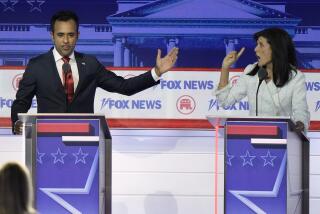Bush Camp Split on Anti-Terror Policy
- Share via
WASHINGTON — In a split that underscores two rival worldviews, the Bush administration is arguing over the extent of the new U.S. war on terrorism--and whether Washington should use its military might for a more expansive war well beyond the immediate problem of Osama bin Laden’s Al Qaeda network and its patrons.
The policy divide, the most serious to date within the young administration of President Bush, has played out most visibly on the decade-old challenge of Iraq and, to a lesser degree, other state sponsors of terrorism, according to administration and other well-placed sources. And in what is becoming a hallmark of the Bush foreign-policy team, it pits the views of the nation’s top diplomat, Secretary of State Colin L. Powell, against the Pentagon’s key strategist, Deputy Defense Secretary Paul D. Wolfowitz.
During strategy sessions since last week’s attack, Wolfowitz has lobbied passionately for widening the mission to include an aggressive campaign to finally bring down the regime of Iraqi President Saddam Hussein, the sources say--despite certain opposition from allies and world powers such as Russia and China.
“Iraq is unfinished business, and this is an opportunity to finish it. He and others in the Pentagon have long had a vendetta about getting rid of Saddam and they believe that irrespective of what happened on Sept. 11, he has to be removed,” said a source familiar with the debate who asked to remain anonymous. “They think now’s the moment to push for it again.”
Powell has maintained that the United States should wage a narrower campaign focused first and foremost on Al Qaeda, a cause for which he can rally--and sustain--strong international cooperation, sources say. The retired four-star general, who orchestrated Operation Desert Storm to oust Iraq from Kuwait in 1991, has also cautioned about the dangers of a wider military engagement with Iraq and other nations on a U.S. list of states that sponsor terrorism.
The debate goes to the heart of differences within the Bush camp on America’s place in the world. Wolfowitz has come to symbolize the “America first” faction that advocates a position of U.S. strength, supremacy and unilateralism--America going it alone, regardless of international sentiment. Powell, in contrast, heads the camp sensitive to U.S. coexistence and cooperation in a globalizing world.
“It’s a seminal battle. One side reflects a fear that America the strong will lose its position because it wasn’t tough enough. The other side says the only way for America to be strong is to work with allies and to carry the weight of world opinion with it rather than try to go it alone,” said Geoffrey Kemp, a National Security Council staffer in the Reagan administration.
Wolfowitz has been the administration’s strongest advocate for toppling Hussein. “This man is a menace. He’s interested in overthrowing his neighbors. He’s interested in acquiring weapons of mass destruction,” he told CNN in July. Pressed on whether the administration would go after the Iraqi leader, Wolfowitz replied, “When we find the right way to do it, I believe we should.”
The news reports that emerged Tuesday suggesting that one of the hijackers met with an Iraqi intelligence agent--and therefore indirectly implicating some role by Baghdad in the attacks--is now widely believed within the administration to have been a leak from a conservative coterie of political appointees allied with Wolfowitz at the Pentagon. The claim was seen as an attempt to keep Iraq on the table after Vice President Dick Cheney said Sunday that the evidence so far points only to Bin Laden and Al Qaeda, not Baghdad.
Around Washington, Wolfowitz and his allies are known as the “string of perles” after Richard Perle, the influential Republican thinker and former Pentagon strategist.
Perle outlined the argument for a broader war on all state sponsors of terrorism in an Op-Ed piece published by Britain’s Daily Telegraph on Monday.
“Those countries that harbor terrorists--that provide the means with which they must destroy innocent civilians--must themselves be destroyed. The war against terrorism is about the war against those regimes. We will not win the war against terror by chasing individual terrorists,” Perle wrote. He specifically named Afghanistan, Iraq, Iran, Libya and Syria as state sponsors.
Powell’s tack is decidedly lower key, and it puts Bin Laden first. “When we have dealt with Al Qaeda, the network, [and] Osama bin Laden, the individual, we will then broaden our campaign to go after other terrorist organizations and forms of terrorism around the world,” Powell said Thursday.
But he has deliberately distanced himself from Wolfowitz’s comments last weekend about “ending” states. On Monday, Powell said the United States hopes “to persuade” states to end support of terrorism. “But I think ‘ending terrorism’ is where I would leave it and let Mr. Wolfowitz speak for himself,” he said.
Other officials say debates and divides between the State Department and the Pentagon are not unusual, especially during crises, because they can be a vital part of policymaking.
“It’s the duty of each party to bring the views of their respective institutions, which have different purposes, to the table. A president always wants to see a range of options--the robust and the not-so-robust. So, some of this is the normal options game, providing the full range of choices,” said a senior U.S. analyst. “It’s normal, even healthy, to have such a debate.”
More to Read
Sign up for Essential California
The most important California stories and recommendations in your inbox every morning.
You may occasionally receive promotional content from the Los Angeles Times.














